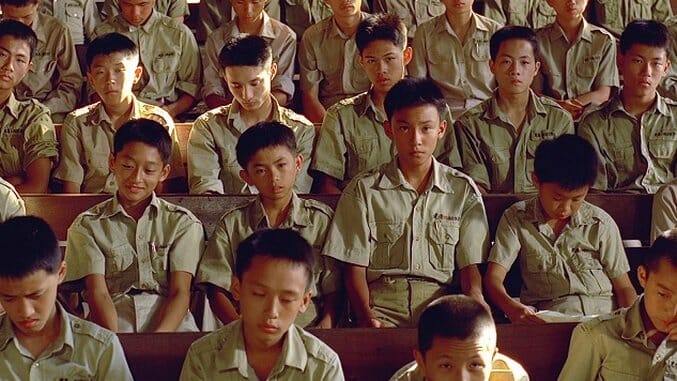
Each month, the Paste staff brings you a look at the best new selections from The Criterion Collection. Much beloved by casual fans and cinephiles alike, The Criterion Collection has for over three decades presented special editions of important classic and contemporary films. You can explore the complete collection here.
In the meantime, here are our top picks for the month of March:
 A Brighter Summer Day
A Brighter Summer Day
Director: Edward Yang
Year: 1991
If you’re looking for a single word to describe A Brighter Summer Day, try “towering.” It is, of course, fashionable to slap that term on any big-scope, small-scale movie oriented around the vicissitudes of mundane, everyday life, but in the case of Edward Yang’s grand four-hour opus, the massive shoe fits. A Brighter Summer Day looms, as ascendant a work of cinema as anything produced by any filmmaker in the last three decades.
You have not seen a film like A Brighter Summer Day because films like A Brighter Summer Day do not, for the most part, exist: It is a film that captures reality delicately and fully without sacrificing any of its ambition. In sorting out the cultural particulars that shaped the ebb and flow of civilized society in 1960s Taipei, Yang paints an indispensable portrait of the era in which he grew up, mapping out how, exactly, sociopolitical friction can lend itself so easily to unease, mistrust, insulation and open outbursts of violence on unassuming city streets. It is beautiful in its austerity and singular in its importance to Taiwanese film, which is probably why Criterion stuffed two discs to the rafters on its first home video release here in the U.S. —Andy Crump
 The Manchurian Candidate
The Manchurian Candidate
Director: John Frankenheimer
Year: 1962
In today’s political climate, it is timely that the Criterion Collection has released John
Frankenheimer’s The Manchurian Candidate. Made when Cold War tensions were rising, the Vietnam War just saw its second tripling of U.S. ground troops and the political atmosphere was stifling with Communist allegations, Frankenheimer’s film feels relevant even in 2016. Rich with strong political commentary, and bolstered by powerful performances (Sinatra giving, perhaps, the greatest performance of his career, supported by an especially frightening Angela Lansbury), the film is still thrilling as it shoulders such heavy themes as individual liberty versus the nature of freedom. Gorgeously shot and framed, especially in the final scenes at Madison Square Garden, The Manchurian Candidate ranks alongside Kubrick’s Dr. Strangelove and Siegel’s Invasion of the Body Snatchers, leaving no stone unturned in its examination of conspiracy and tensions between political ideologues.
Criterion’s lovely edition comes equipped with a 1997 audio commentary by the director, an interview with Errol Morris expressing his admiration for the film, and much more. —Nelson Maddaloni
 A Poem is a Naked Person
A Poem is a Naked Person
Director: Les Blank
Year: 1974 (released 2015)
If you want to get the most out of Les Blank’s filmed portrait of Leon Russell, A Poem is a Naked Person, you might be better off starting with the extras before getting into the feature itself. Like A Brighter Summer Day, the film is being sold by Criterion in part on the back of its unavailability, which lends itself to natural curiosity as to why, exactly, it took four decades for Blank’s documentary to make its way to screens of all sizes. That’s where the interview with Russell himself, plus Blank’s son Harrod, comes in handy: As it happens, Russell wasn’t especially fond of Blank’s documentarian approach, which puts more emphasis on the world around Russell than on Russell himself. Maybe you could call blocking A Poem is a Naked Person’s release a dick move, but at the same time you can kind of understand Russell’s side here, too. Blank, rascally to the core, doesn’t much care for rules or for structure, and instead of simply documenting as one might expect, he shows the world as he sees it, filtered through his own vision and his own experience (though, in fairness, he does capture a bevy of great concert scenes in the process). The film is an oddity by consequence, but one well worth exploring. —AC
 Paris Belongs to Us
Paris Belongs to Us
Director: Jacques Rivette
Year: 1960
Jacques Rivette’s first feature film, directed in 1957 and released in 1960, may not have been as popular as those of his New Wave contemporaries, but it is every bit as accomplished as anything in that period by Godard or Truffaut. Paris Belongs to Us is a mystery on the surface, but willing to delve deep into the realms of disillusionment, paranoia and postmodernism in a post-war world. Rivette might have gone on to make better films, but as a first it feels just as mature as anything he’ll go on to do, albeit a bit less avant-garde or radical. All the same, the director’s later-typified leitmotifs are all here—a play that is never performed, literary and cinematic connections, radical politics, disillusionment with the system regardless of what that system may be—and so the film at the least serves as a perfect prelude to a career of cinematic genius. Criterion special features include a short by Rivette starring some of his contemporaries and an excellent interview with Richard Neupert about the French New Wave. —NM